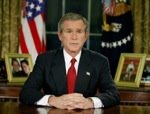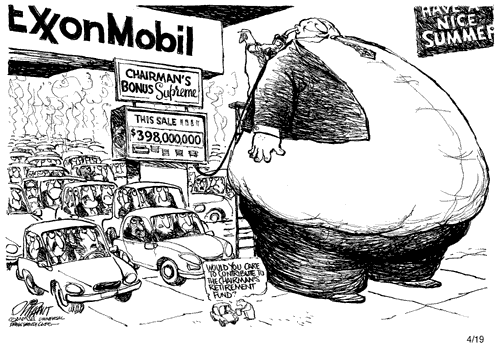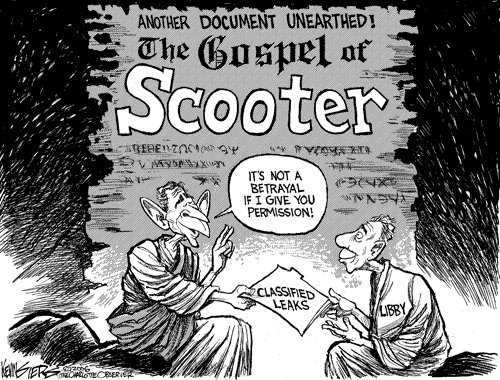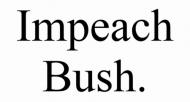Lunch Period Poli Sci
 Lunch Period Poli Sci
Lunch Period Poli SciBy David Brooks from The New York Times
College is still probably a good idea, but everything you need to know about America you can learn in high school. For example, if you want to understand American class structure you'd be misled if you read Marx, but you'd understand it perfectly if you look around a high school cafeteria.
The jocks sit here; the nerds sit there; the techies, drama types, skaters, kickers and gangstas sit there, there and there. What you see is not class in the 19th-century sense, but a wide array of lifestyle cliques, some richer, some poorer, but each regarding the others as vaguely pathetic and convinced of its moral superiority.
Similarly, when it comes to politics, high school explains most everything you need to know. In 1976, Tom Wolfe wrote an essay for Commentary in which he noted that our political affiliations are shaped subrationally. He went on to observe that especially when we are young and forming our identities, we make sense of our lives by running little morality plays in our heads in which the main characters are Myself, the hero, and My Adolescent Opposite, the enemy.
"Forever after," Wolfe writes, "the most momentous national and international events are stuffed into the same turf. The most colossal antagonists and movements become merely stand-ins for My Adolescent Self and My Adolescent Opposite.
"If My Opposite, my natural enemy in adolescence, was the sort of person who seemed overly aggressive, brutish and in love with power, I identify him with the 'conservative' position. If My Opposite, my natural enemy in adolescence, seemed overly sensitive, soft, cerebral and incapable of action, I identify him with the 'liberal' position."
And so it goes. In every high school there are students who are culturally and intellectually superior but socially aggrieved. These high school culturati have wit and sophisticated musical tastes but find that all prestige goes to jocks, cheerleaders and preps who possess the emotional depth of a cocker spaniel. The nerds continue to believe that the self-reflective life is the only life worth living (despite all evidence to the contrary) while the cool, good-looking, vapid people look down upon them with easy disdain on those rare occasions they are compelled to acknowledge their existence.
These sarcastic cultural types may grow up to be rich movie producers, but they will remember their adolescent opposites and become liberals. They may grow up to be rich lawyers but will decorate their homes with interesting fabrics from the oppressed Peruvian peasantry to differentiate themselves from their jock opposites.
In adulthood, the former high school nerds will savor the sort of scandals that befall their formerly athletic and currently corporate adolescent enemies — the Duke lacrosse scandal, the Enron scandal, the various problems that have plagued the frat boy Bush. In the lifelong struggle for moral superiority, problems that bedevil your adolescent opposites send pleasure-inducing dopamine surging through your brain.
Similarly, in every high school there are jocks, cheerleaders and regular kids who vaguely sense that their natural enemies are the brooding poets who go off to become English majors. These prom kings and queens may leave their adolescent godhood and go off to work as underpaid sales reps despite their coldly gracious spouses and effortlessly slender kids, but they will still remember their adolescent opposites and become conservatives. They will experience surges of orgiastic triumphalism when Sean Hannity eviscerates the scuffed-shoed intellectuals who have as much personal courage as a French chipmunk in retreat.
Because these personal traits are so pervasive and constant, Republican administrations tend to be staffed by people who are well-balanced but dull, while Democratic administrations tend to be staffed by people who are interesting but neurotic. Because these rivalries are so permanent, nobody has ever voted for a presidential candidate they wouldn't have had lunch with in high school.
The only real shift between school and adult politics is that the jocks realize they need conservative intellectuals, who are geeks who have decided their fellow intellectuals should never be allowed to run anything and have learned to speak slowly so the jocks will understand them. Meanwhile, the geeks have learned they need to find popular kids like F.D.R. to head their tickets because the American people will never send a former geek to the White House. (Bill Clinton was unique in that he was a member of every clique at once.)
The central message, though, is that we never escape our high school selves. Vote for Pedro.




































